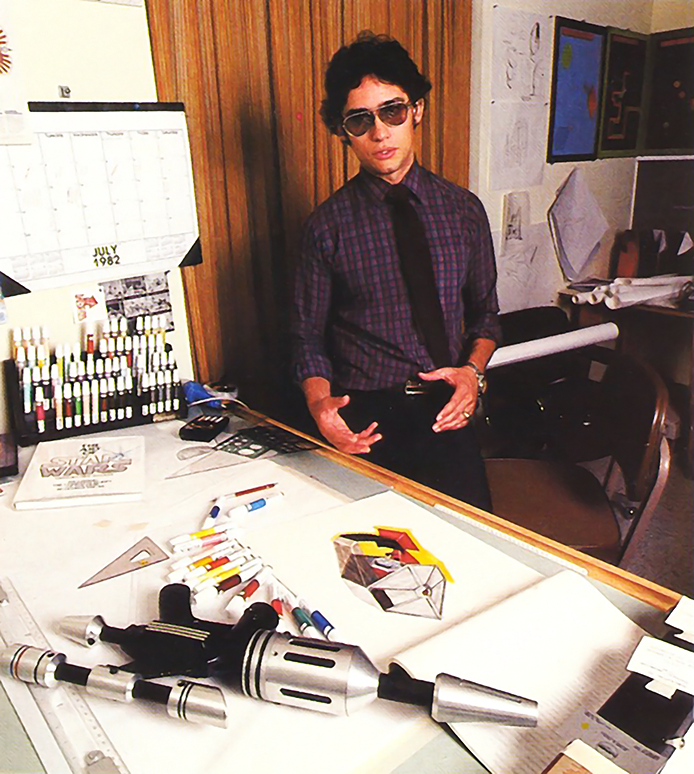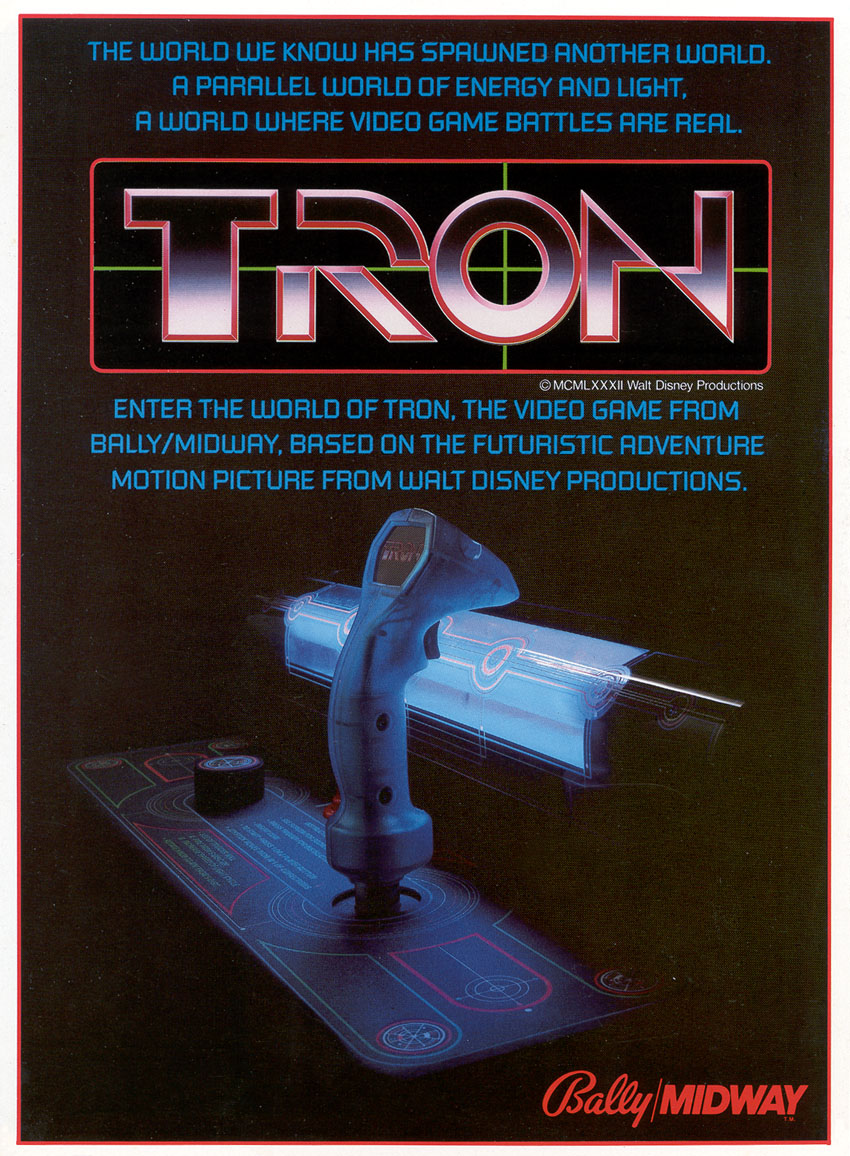A few posts back I promised to continue shining a light on Midway’s impact on the arcade industry back in the early eighties. So this week I wanted to share some interesting documentation relating to Midway’s 1982 arcade hit Tron. Entirely by coincidence, today also marks the 40th Anniversary of the release of this classic title!
Inspired by the events of Walt Disney Production’s film which hit cinemas a few months earlier, the Tron arcade game is regarded as a classic title amongst today’s collectors.

The cabinet itself is a spectacular sight, featuring special backlighting designed to mimic the stunning visual effects found in the film itself. It is worth pointing out that whilst the movie was regarded as something of a flop, the arcade game actually out-grossed the film’s box office performance, generating an estimated $45,000,000 in revenue by the end of 1983.

Not many arcade titles up to that point were franchised releases, so handling such a delicate IP required nerves of steel – getting the gameplay right would be vital to Midway’s relationship with the mighty Disney corporation. Indeed, looking at the complexity of the film’s production, this was to be an ambitious title for Midway to take on. But take it on they did.
The company decided to ask two teams to “pitch” for how the game should look and play, and instructed in-house designers Bill Adams and George Gomez, and external consultants Dave Nutting Associates (responsible for Gorf amongst other things) to both come up with a proposal for the game.

The two proposed designs were quite different: The Nutting idea was based around a 3D vector title, whilst the in-house plan was a raster game based on a series of mini games. Given the time pressures that Midway were under to get the title released, and the potential perceived complexities of the vector hardware available at the time, the in-house raster idea was given the green light.
Little has been known about the development process, until a former employee of Bally/Midway anonymously shared several documents in 2001 that shed some light on how the game came to be. He states:
I came across some documents that were destined for eventual destruction. One group of files in particular belonged to a middle manager at Bally, and this is where I found some copies of the original Tron design documents dating back to 1981.
What he shared was the proposal document drawn up by Adams and Gomez, along with some other more formal correspondence between Disney, Dave Nutting and Midway. It makes for interesting reading.
The Adams/Gomez proposal called for a series of Mini Games all taking place within the Tron universe. These are outlined as:
Rings – this was to be a duel between the characters Tron and Sark, where discs were thrown by the player towards Sark. Ultimately due to time constraints and the belief that the idea was strong enough to stand alone, this proposal would be released as a separate game called Discs Of Tron.
Paranoia – here the player builds a bridge of spiders to reach an island on the opposite side of the screen. This mini game was dropped from the final version of Tron (but sounds like a nice idea on paper).
Tank Pursuit – the player drives tank around a top-down maze, shooting enemy tanks. Think Atari’s Tank meets Cinematronics’ Armor Attack!
Space Spores – here, the player has to blast a path through spores that grow and hamper progress to an exit.
I/O Tower – the player tries to reach an energy socket while avoiding ‘electrifying blue warriors’
Light Cycles – similar to Snake/Nibbler, the player drives a futuristic looking light cycle that leaves a trail. The strategy is to block in and destroy enemy cycles whilst avoiding crashing.
You can view and read the full original document below. If you’re familiar with Tron, you should recognise gameplay elements from this proposal document and see what was ultimately included in the final game and what was not.
Particularly interesting is another document which appears to be a letter sent by Dave Nutting to to Dave Marofske at Midway, following a meeting regarding the design of the game that Nutting was invited to. Some interesting subtle politics are obvious if you read between the lines.

Having had his proposal rejected, Nutting presumably was asked to join this early planning meeting and share his thoughts on the successful pitch (which of course wasn’t his!). Dated December 1981, Nutting had the following to say:
Dear Dave,
I came away from Monday’s Tron meeting with some concerns for which I have given some thought.
First, I was impressed with the Tron presentation. Bill and George obviously spent a great deal of thought and energy developing their game concepts. I see emerging a real spark of creative energy.
My concerns lie in the area of too many ideas and many unknowns. Unless these areas are addressed immediately, to commit for a Tron delivery of 1 April is courting disaster.
Dave Nutting in a letter to Midway’s Dave Morofske
Nutting’s concerns are spelled out further in his letter (again, view below). Was there a touch of sour grapes here? We will never know! However, given that the final game only housed four mini games during each round, it seems that the development team did heed the concerns of an overly-complex proposal, which we can only guess came to the fore due to the four month development period that Midway had set itself.
Tron of course ended up being somewhat watered down from these initial ideas. At the start of each level, the player is taken to a “Game Grid” selection screen divided into four quadrants. The player must choose a quadrant, each of which corresponds to a different sub-game. The four mini games that made the final Tron cut were:
I/O Tower:

MCP Cone:

Light Cycles:

Battle Tanks:

For completeness, here’s another couple of memos – one internal at Midway following an early meeting with Disney (that even Steven Lisberger, the writer, creator and director of the Tron movie attended), and then another from Disney to Midway who share a selection of slides, story boards and other clarifications about look and feel; presumably to help Gomez and team design the game as agreed.
Interesting stuff. Despite the early concerns and clear pressure to create a game from scratch based around a Disney franchise, Midway got its game out and the final package was pretty spectacular, leveraging design elements from the movie:
Here’s a decent cabinet and gameplay review with Todd at TNT Amusements:
As mentioned earlier, one of the mini game ideas referenced in ‘Rings’ would ultimately be developed as a second game in the franchise, Discs Of Tron. In my view, the ‘environmental’ version of this cabinet is one of the most spectacular of the Golden Age arcade releases.
Check out this review of the cabinet and gameplay here:
So there you have it – super cool to be able to pull back the curtain and read some of the back and forth during the early development process. Hope you enjoyed this insight into the development of Midway’s Tron.
See you next time.
Tony











Thanks for another cool article. Keep them coming, very enjoyable reads.
I wish they wouldn’t of rushed Tron though. They could have created more depth and variation to each of the four mini games.
LikeLiked by 1 person
Hey Tony, nice article about Tron. When I was a kid, the movie was too surreal for me, now I have both movies in bluray 😀
However, Tron is a nice game but I have to admit, Disc´s of Tron is a bit better imo.
And thx for sharing these documents!!
cheers
Andi
LikeLiked by 1 person
Great article as usual. I was lucky enough to play the environmental version of disks of tron at a local little arcade in Fremont ,CA back in the day. Did not know that Dave Nutting Associates was involved in this, that is weird.
LikeLiked by 1 person
TRON is a film I never really got as a kid, despite the Disney influence, but have warmed considerably in latter years.
The game has always felt rushed to me, so it was interesting to read your article, which alludes it probably was.
I would love to experience the full EDOT cabinet, one day maybe..
LikeLiked by 1 person
Nothing like the golden age of video games.
LikeLike
I would have liked to hear about the vector proposal that wasn’t chosen!
I owned an Environmental DOT until about a year ago when I had to let it go. 😦
Neil1637 asked if the grid bugs mentioned in the movie were in place just to be able to be referenced in the game. I always wondered that myself – they are so out of place, hand animated (rather than CG) with the distinctive hand animated disney style and they do nothing to forward the story. The scene, had it not been for the game tie-in, should have been cut.
LikeLike